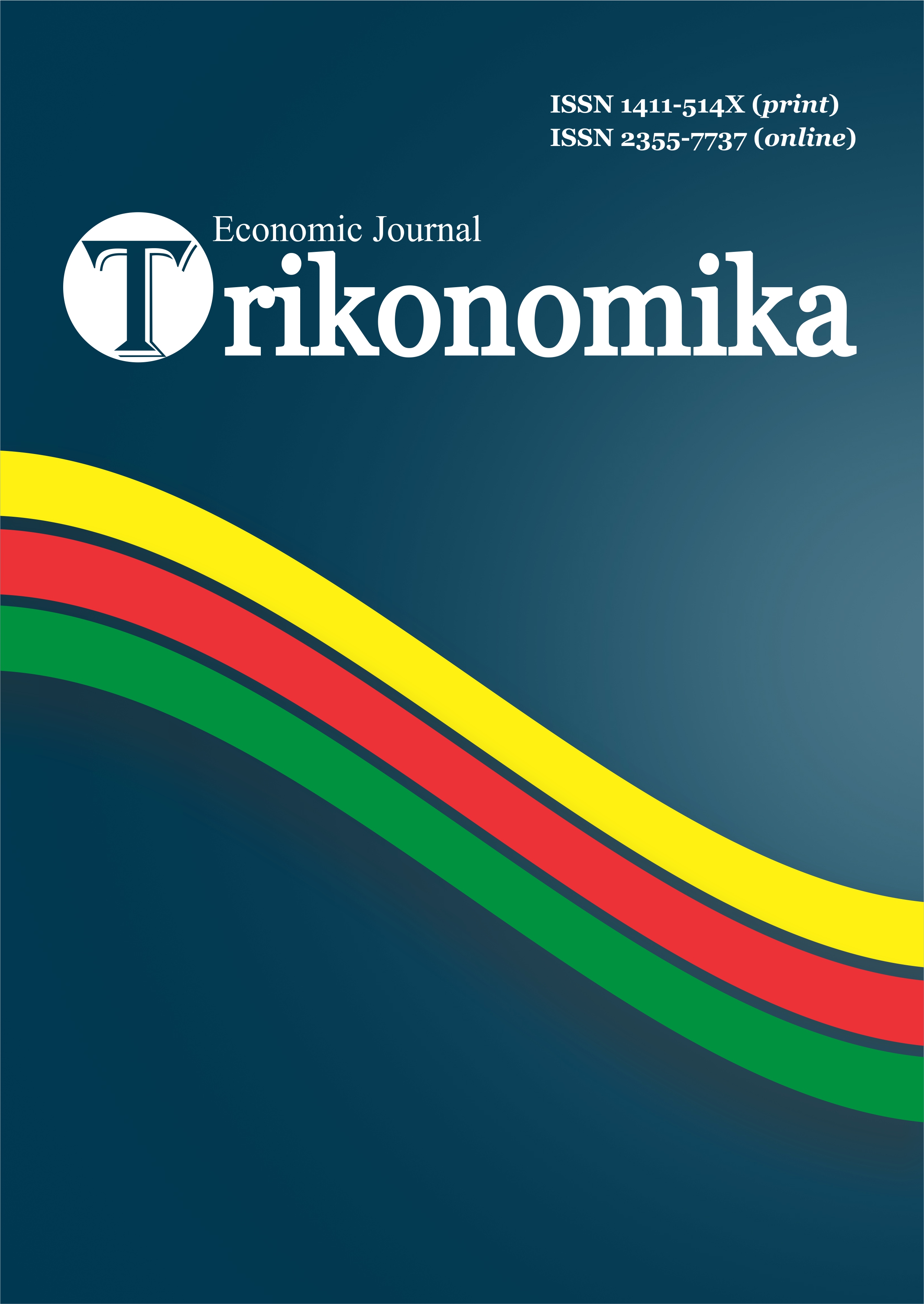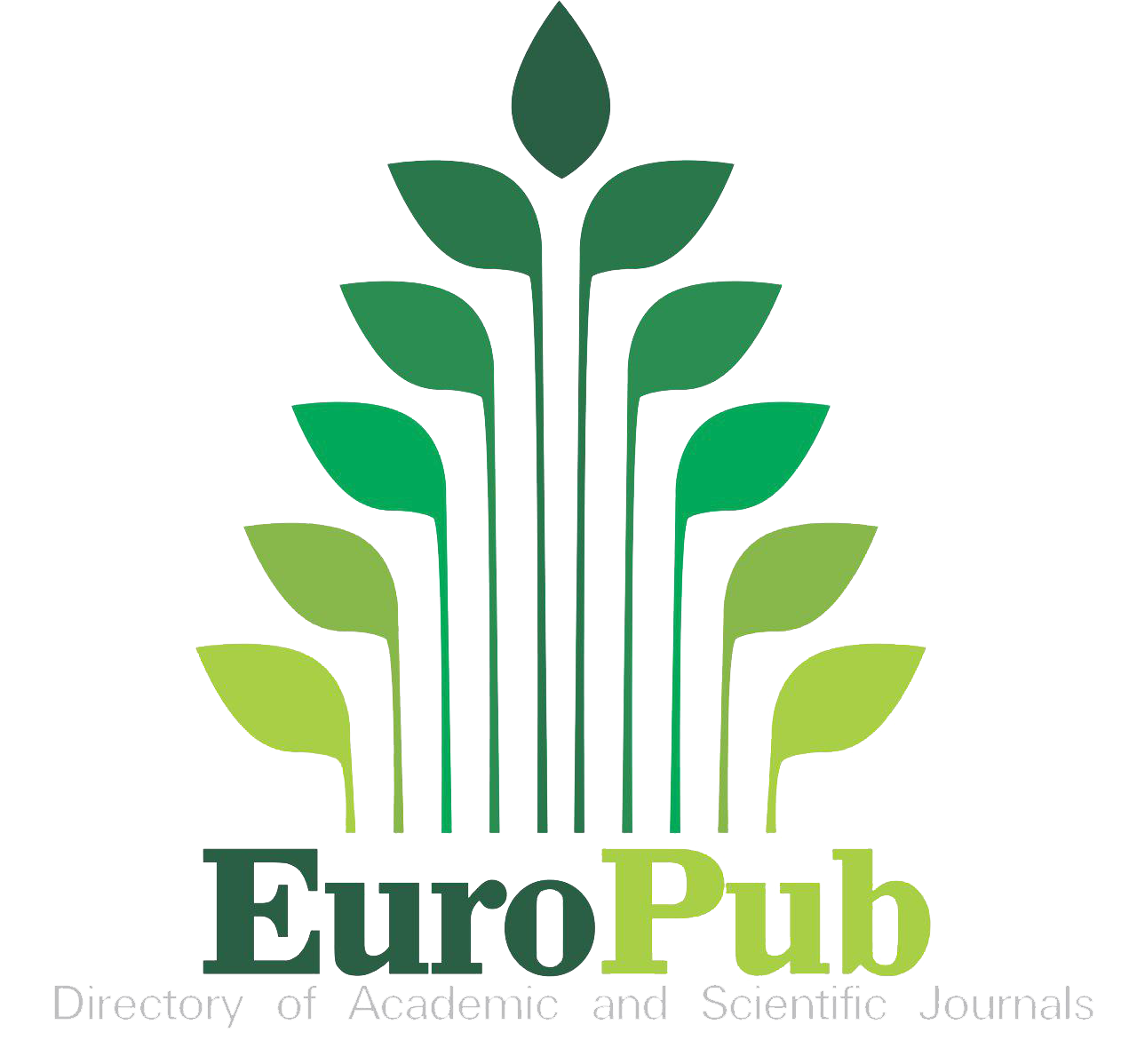THE INFLUENCE OF GREEN PRODUCTS ON GREEN MARKETING AND SUSTAINABLE TOURISM
DOI:
https://doi.org/10.23969/trikonomika.v24i1.21200Keywords:
Bandung Area; Green Marketing; Green Products; Sustainable Tourism, bandung area, green marketing, green products, sustainable tourismAbstract
Sustainable tourism is becoming an important priority in the development of tourist destinations, which are facing environmental challenges. This research aimed to explore the influence of green products on sustainable tourism in the Bandung tourist area, where green marketing serves as a moderating factor. Quantitative methods combined with descriptive verification were used to survey several tourist attractions that have implemented the concept of green tourism. The respondents comprised 210 visitors and the multivariate data analysis method was factor analysis with covariance-based SEM-PLS using SmartPLS. The results show that green products independently influence sustainable tourism from green marketing as a moderating variable. Green products influence the ability of tourist attractions in the Bandung area to continue operating because the local community has the knowledge and cares for this industry. As a result, this understanding will increase trust in tourism sector for both tourist and companies offering the services.
Downloads
References
Adnan, M., Rashid, M., Khan, S. N., & Baig, F. J. (2023). Impact of Service Quality on Business Sustainability: A Mediation-Moderation Prospective. Pakistan Journal of Humanities and Social Sciences, 11(2), 2663–2671.
Ahmad Mir, T. (2016). Green Marketing: A Pathway towards Sustainability of Tourism Products. Journal of Business and Management, 18 (11), 86–90.
Alkhatib, S., Kecskés, P., & Keller, V. (2023). Green Marketing in the Digital Age: A Systematic Literature Review. Sustainability, 15(16), 12369. https://doi.org/10.3390/su151612369
Ayad, T., Eshaer, I. A., Moustafa, M. A., & Azazz, A. M. S. (2021). Green Product and Sustainable Tourism Development: The Role of Green Buying Behavior. Revista Argentina de Clínica Psicológica, 30(2), 236.
Bravo, L. L., Macias, N. P., & Valdes, Z. M. (2022). Community-Based Tourism in Ecuador: Notes in Times of Pandemic. Smart Tourism, 3(2), 11.
Chen, K., & Deng, T. (2016). Research on the Green Purchase Intentions from the Perspective of Product Knowledge. Sustainability, 8(9), 943.
Donohoe, H. M. (2012). Sustainable Heritage Tourism Marketing and Canada’s Rideau Canal World Heritage Site. Journal of Sustainable Tourism, 20(1), 121–142. https://doi.org/10.1080/09669582.2011.617826
Esparon, M., Stoeckl, N., Farr, M., & Larson, S. (2015). The Significance of Environmental Values for Destination Competitiveness and Sustainable Tourism Strategy Making: Insights from Australia’s Great Barrier Reef World Heritage Area. Journal of Sustainable Tourism, 23(5), 706–725. https://doi.org/10.1080/09669582.2014.998678
Firmansyah, H., Nurrachmi, I., Umiyati, H., Ariyanto, A., Putra, A. R., Rustandi, N., Trenggana, A. F. M., Syahputra, S., Rahayu, D. W. S., Suherman, A., Huda, A. M., Burhanudin, J., Pratiwi, C. P., Pertiwi, W. N. B., K, M. F. A., & Yudawisastra, H. G. (2022). Teori Marketing. In A. Masruroh (Ed.), CV Widina Media Utama.
Gheorghe, G., Tudorache, P., & Roşca, I. M. (2023). The Contribution of Green Marketing in the Development of a Sustainable Destination through Advanced Clustering Methods. Sustainability, 15(18), 13691.
Haid, M., & Albrecht, J. N. (2021). Sustainable Tourism Product Development: An Application of Product Design Concepts. Sustainability, 13(14), 7957.
Han, H. (2021). Consumer Behavior and Environmental Sustainability in Tourism and Hospitality: A Review of Theories, Concepts, and Latest Research. Sustainable Consumer Behaviour and the Environment, 1–22.
Hasrama, E., Myftaraj, E., & Noti, E. (2025). Exploring the Impact of Green Advertising and the Mediating Role of Consumer Awareness on Sustainable Tourism Purchase Attitude Albanian Case. International Journal of Innovative Research and Scientific Studies, 8(1), 1380–1392.
Higgins-Desbiolles, F. (2020). The “War Over Tourism”: Challenges to Sustainable Tourism in the Tourism Academy after COVID-19. Journal of Sustainable Tourism, 29(4), 551–569.
Hill, R. (1998). What Sample Size is “Enough” in Internet Survey Research. Interpersonal Computing and Technology: An Electronic Journal for the 21st Century, 6(3–4), 1–12.
Ibnou-Laaroussi, S., Rjoub, H., & Wong, W.-K. (2020). Sustainability of Green Tourism Among International Tourists and Its Influence on the Achievement of Green Environment: Evidence from North Cyprus. Sustainability, 12(14), 5698.
Kar, S. K., & Harichandan, S. (2022). Green Marketing Innovation and Sustainable Consumption: A Bibliometric Analysis. Journal of Cleaner Production, 361, 132290.
Lin, C.-J., & Chen, H.-Y. (2016). User Expectancies for Green Products. Social Enterprise Journal, 12(3), 281–301. https://doi.org/10.1108/sej-02-2016-0004
Meuthia, M., Lita, R. P., & Faisal, R. F. (2019). Green Supply Chain Management: Perspectives of Employees on Hospitality and Tourism Sectors in West Sumatera. Trikonomika, 18(2), 62–68.
Mohd Suki, N. (2016). Green Product Purchase Intention: Impact of Green Brands, Attitude, and Knowledge. British Food Journal, 118(12), 2893–2910. https://doi.org/10.1108/BFJ-06-2016-0295
Naparin, M. (2025). Experience Economy in Green Marketing Perspective and Its Influence on Sustainability-Oriented Loyalty of Tourists in Wetland Tourism Park with Environmental-Based View Theory Approach. International Review of Management and Marketing, 15(2), 85–94. https://doi.org/10.32479/irmm.17851
Nassani, A. A., Yousaf, Z., Grigorescu, A., & Popa, A. (2023). Green and Environmental Marketing Strategies and Ethical Consumption: Evidence from the Tourism Sector. Sustainability, 15(16), 12199.
Papadas, K. K., Avlonitis, G. J., & Carrigan, M. (2017). Green Marketing Orientation: Conceptualization, Scale Development and Validation. Journal of Business Research, 80, 236–246. https://doi.org/10.1016/j.jbusres.2017.05.024
Polonsky, M. J. (1994). An Introduction to Green Marketing. Electronic Green Journal, 1(2). https://doi.org/10.5070/g31210177
Reddy, K. P., Chandu, V., Srilakshmi, S., Thagaram, E., Sahyaja, C., & Osei, B. (2023). Consumers Perception on Green Marketing Towards Eco-Friendly Fast Moving Consumer Goods. International Journal of Engineering Business Management, 15, 18479790231170960.
Ribeiro, M. A., Seyfi, S., Elhoushy, S., Woosnam, K. M., & Patwardhan, V. (2023). Determinants of Generation Z Pro-Environmental Travel Behaviour: The Moderating Role of Green Consumption Values. Journal of Sustainable Tourism, 1–21.
Sasana, H., Novitaningtyas, I., & Panjawa, J. L. (2020). Does Social Media Improve the Welfare of Tourism Businesses? Trikonomika, 19(1), 36–42.
Seregina, A. (2020). How Sustainability Perceptions Influence Buying Decisions in Travelling Industry?: Teko Travel Case.
Sharma, A. (2022). Green Tourism Products, Pro-environmental Tourists and Their Perceptions: A Case Study of Chandigarh. IOSR Journal of Business and Management (IOSR-JBM) e-ISSN, 21–24.
Sidali, K. L., Huber, D., & Schamel, G. (2017). Long-Term Sustainable Development of Tourism in South Tyrol: An Analysis of Tourists’ Perception. Sustainability (Switzerland), 9(10). https://doi.org/10.3390/su9101791
Sisriany, S., & Furuya, K. (2020). Ecotourism Policy Research Trends in Indonesia, Japan, and Australia. Jurnal Manajemen Hutan Tropika, 26(2), 178.
Streimikiene, D., Svagzdiene, B., Jasinskas, E., & Simanavicius, A. (2021). Sustainable Tourism Development and Competitiveness: The Systematic Literature Review. Sustainable Development, 29(1), 259–271.
Sumarsono, H., Narmaditya, B. S., Rahmawati, F., Prayitno, P. H., & Sahid, S. (2025). Green Marketing for Sustainability Business: A Bibliometric Analysis. Multidisciplinary Reviews, 8(3), 2025078.
Widana, K. A., & Sutama, I. K. (2020). The Management of Cau Belayu Tourism Village Based on Green Tourism Business Scheme. International Journal of Green Tourism Research and Applications, 2(2), 53–62.
Wulandari, A., Marcelino, D., Baharta, E., & Taufiq, R. (2023). Religiusity Moderated Halal Tourism as The Antecedent of Tourist Satisfaction in Bandung. Trikonomika, 22(1), 43–51.
Yudawisastra, H. (2021). Pengaruh Produk Hijau Terhadap Bisnis yang Berkelanjutan Studi pada Restoran di Kabupaten Badung di Masa Pandemi COVID19. Welfare, 2(1).
Yudawisastra, H., Burhanudin, J., Samoedra, A. D., & Voda, M. (2023). The Effect of Green Products on Sustainable Tourism Through Green Marketing in Natural Tourism Destinations in Garut, West Java. International Journal of Green Tourism Research and Applications, 5(1), 45–51.
Yudawisastra, H. G., & Andriyani, Y. (2021). Pengaruh Variabel Hijau Terhadap Bisnis Yang Berkelanjutan: Studi Sektor Kuliner Destinasi Wisata Joglosemar Saat Pandemi COVID-19. Jurnal Industri Pariwisata, 3(2).
Yudawisastra, H. G., Anwar, M., Nidar, S. R., & Azis, Y. (2023). The Emergence of Green Management and Sustainability Performance for Sustainable Business at Small Medium Enterprises (SMEs) in the Culinary Sector in Indonesia. International Journal of Sustainable Development and Planning, 18(5), 1489–1497. https://doi.org/10.18280/ijsdp.180519
Yudawisastra, H. G., Suwarna, A., & Mansur, D. M. (2022). The Impact of Green Products on Sustainability Business with Green Marketing as a Moderating Variable in Restaurant in Badung Bali. International Journal of Business Studies, 6(3), 241–251.
Downloads
Published
How to Cite
Issue
Section
License
Copyright (c) 2025 TRIKONOMIKA

This work is licensed under a Creative Commons Attribution-NonCommercial-ShareAlike 4.0 International License.











